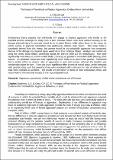Files in this item
The impact of parenthood on physical aggression : evidence from criminal data
Item metadata
| dc.contributor.author | Boothroyd, Lynda G. | |
| dc.contributor.author | Cross, Catharine P. | |
| dc.date.accessioned | 2017-03-23T00:32:59Z | |
| dc.date.available | 2017-03-23T00:32:59Z | |
| dc.date.issued | 2016-10-14 | |
| dc.identifier | 241041449 | |
| dc.identifier | 92785b31-5cc1-4566-bcca-71cae9d202f6 | |
| dc.identifier | 85028257163 | |
| dc.identifier | 000385940300007 | |
| dc.identifier.citation | Boothroyd , L G & Cross , C P 2016 , ' The impact of parenthood on physical aggression : evidence from criminal data ' , Aggressive Behavior , vol. 42 , no. 6 , pp. 577-584 . https://doi.org/10.1002/ab.21652 | en |
| dc.identifier.issn | 0096-140X | |
| dc.identifier.other | ORCID: /0000-0001-8110-8408/work/60427428 | |
| dc.identifier.uri | https://hdl.handle.net/10023/10507 | |
| dc.description.abstract | Evolutionary approaches to sex differences in physical aggression weigh the potential benefits of aggression against the likely costs to inclusive fitness, with some authors focusing on the damage physical injury would do to female inclusive fitness, and others on the extent to which success in physical competition may particularly enhance male fitness. This study tested a hypothesis derived from these approaches: that parents would be less physically aggressive than non-parents because of the damage any physical injury would do to their inclusive fitness. Analysis was carried out using the United States federal sentencing records for 1994–1999 (22,344 individuals). The proportion of theft convictions which were violent (robbery; vs. larceny) was significantly greater for men than women (odds ratio 7.7). As predicted, non-parents were significantly more likely to be violent than parents (odds ratio 1.6). Parenthood had a similar effect on relative rates of violence in men and women, although the baseline was considerably higher for men. There was also a significant effect in men of marital status, which interacted with parental status such that parenthood was only associated with a reduction in rates of violence in males recorded as partnered. The results are interpreted in terms of both evolutionary theory and recent work on the hormonal impacts of marriage and parenthood. | |
| dc.format.extent | 8 | |
| dc.format.extent | 341035 | |
| dc.language.iso | eng | |
| dc.relation.ispartof | Aggressive Behavior | en |
| dc.subject | Aggresion | en |
| dc.subject | Parenthood | en |
| dc.subject | Violent crime | en |
| dc.subject | Testosterone | en |
| dc.subject | Sex differences | en |
| dc.subject | BF Psychology | en |
| dc.subject | NDAS | en |
| dc.subject | SDG 16 - Peace, Justice and Strong Institutions | en |
| dc.subject.lcc | BF | en |
| dc.title | The impact of parenthood on physical aggression : evidence from criminal data | en |
| dc.type | Journal article | en |
| dc.contributor.institution | University of St Andrews. School of Psychology and Neuroscience | en |
| dc.contributor.institution | University of St Andrews. Centre for Social Learning & Cognitive Evolution | en |
| dc.identifier.doi | https://doi.org/10.1002/ab.21652 | |
| dc.description.status | Peer reviewed | en |
| dc.date.embargoedUntil | 2017-03-22 |
This item appears in the following Collection(s)
Items in the St Andrews Research Repository are protected by copyright, with all rights reserved, unless otherwise indicated.

